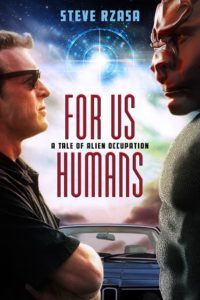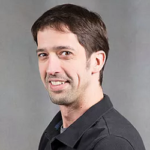Steve Rzasa is the author of several novels of science-fiction, steampunk, and fantasy—with a bunch more in progress. His latest novel is For Us Humans: A Tale of Alien Occupation (Enclave), a sort of buddy cop story with a twist. In this interview, Steve explains what inspired the novel, why the book is set in an alternate 2018, and how For Us Humans can be a template for how Christians can engage with the world…
Steve, For Us Humans is like a buddy cop action movie with an alien that wants to talk about Jesus—and the human that’s stuck with him. What inspired this particular mix of ideas for your novel?
 I’ve long been fascinated by C.S. Lewis’ treatise on the possibility of Christian aliens in “Religion and Rocketry,” so much so that I quoted it at the beginning of For Us Humans. Then I read a biography called Priceless, about the man who started the FBI’s art crime division. Something clicked, and I knew I had to marry the two worlds.
I’ve long been fascinated by C.S. Lewis’ treatise on the possibility of Christian aliens in “Religion and Rocketry,” so much so that I quoted it at the beginning of For Us Humans. Then I read a biography called Priceless, about the man who started the FBI’s art crime division. Something clicked, and I knew I had to marry the two worlds.
Trick was, the main character Caz Fortel could be crude and brash, while his alien counterpart Nil was more thoughtful and experienced. Bringing those guys together made the story what it is. I love buddy cop flicks, so getting the chance to do it in a new way with a new theme behind it was exciting.
What was the process of building the world for this novel? And why is it an alternate 2018?
The book is set in an alternate version of the present because I wanted to take a world everyone is familiar with and tweak it with a few interesting changes. Part of what inspired that setting was brainstorming the novel while I was on vacation. I noticed a handicapped parking sign, and immediately thought, “If aliens were around today, I bet they’d have their own parking spaces, especially if they were in charge.” From there the idea steamrolled.
It also made it a fun exercise to deal with human prejudice, because it’s something many people are familiar with. And prejudice against aliens by humans has played a role in entertainment before, such as in the TV show and movie Alien Nation.
When it came time to build an alternate present, I chose to show humanity benefiting from advances in technology that were either due to the aliens sharing bits of their knowledge, or from human tech improving at an accelerated rate. I posited that we’d get a leg up on research spending if military expenditures were redirected. And since the alien Consociation forbids our nations from warring, that made for an interesting aspect of the story world.
While writing the novel, which character surprised you the most?
Actually, several characters proved surprising. Caz Fortel’s depth of heart when he finds out a secret family situation was unexpected. Nil’s humility about his past mistakes and his openness about his yearning to connect with the Almighty was, too. Both antagonists intrigued me as the story developed, too, but I won’t say much about them here for fear of spoilers.
But I think Isaac, Caz’s best friend and an FBI special agent, surprised me the most, because I didn’t expect him to take the actions he did. And those actions make the story all the more compelling.
What are the challenges of worldbuilding as a Christian author? Does your faith make it easier or more of a challenge?
 Most of my novels are science fiction, so the worldbuilding involves advanced technology. My faith doesn’t make it more difficult, because I spend a lot of time extrapolating from history and technology what future versions and advancements would be like.
Most of my novels are science fiction, so the worldbuilding involves advanced technology. My faith doesn’t make it more difficult, because I spend a lot of time extrapolating from history and technology what future versions and advancements would be like.
For my fantasy novels, The Bloodheart and The Lightningfall, that’s a trickier question. Those stories involve the use of elemental magic by both heroes and villains. In that case, I start from the perspective that magic in the story world is not what the Bible classifies as “witchcraft” or “sorcery.” Instead, it is an elemental force that I made part of the fictional Creation, and therefore just as much God’s handiwork as gravity and wind.
In summary, the more fantastical the story, the more I reference my faith to determine if what I’m portraying jives with the Bible, if the concept is even mentioned.
Is For Us Humans geared more toward opening a dialogue with non-Christian readers, or helping Christian readers understand how to open that dialogue with the world?
For Us Humans is meant to do both. I’d like Christian readers to see that their idea of who “should” become a Christian, who is “acceptable” to seek the faith, is not always the same as who God chooses to pursue.
Frankly, we don’t always like our fellow believers, especially when then come from a background we consider more worldly or sinful. Nil isn’t even human, and so that raises a whole host of questions mentioned earlier.
On the other hand, I’d like non-Christians to broaden their minds and consider the possibility of a supernatural being, a supreme deity whose existence and reach isn’t bound to our corner of the galaxy. He did create everything, after all.
Visit Steve Rzasa’s author page:
https://www.familyfiction.com/authors/steve-rzasa


